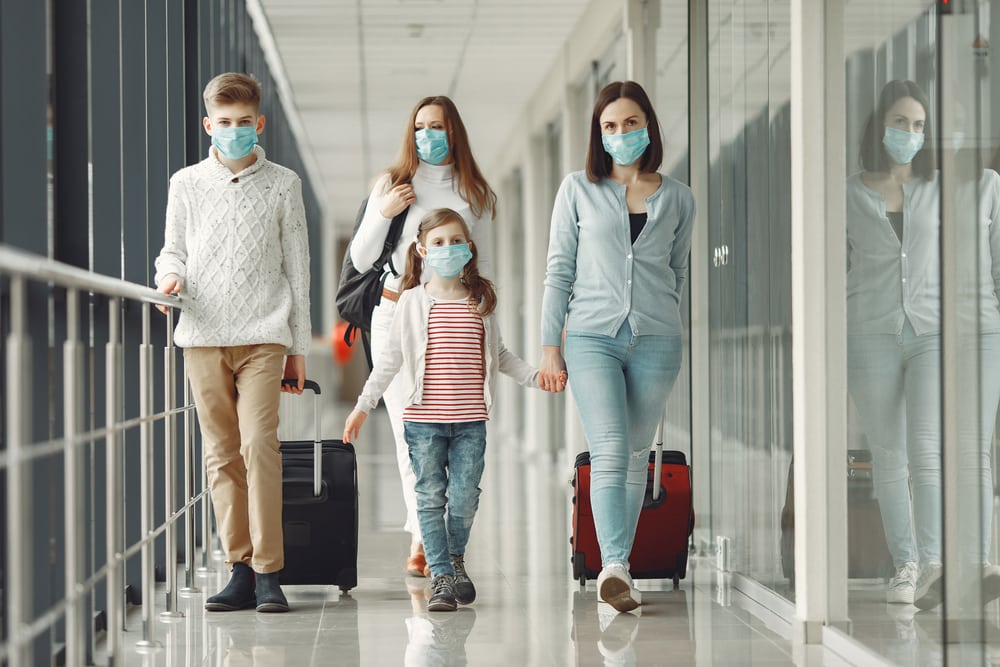About 2,238,462 travelers passed through Transportation Security Administration (TSA) checkpoints on August 1, 2021. Per TSA data, that’s nearly three times the number of travelers logged a year ago on August 1, 2020. The data doesn’t lie: With about 60 percent of the country at least partially vaccinated against COVID-19, Americans are undoubtedly feeling safer and more enthusiastic about late-summer travel. But as the COVID-19 Delta variant sweeps the nation and sends cases skyrocketing once again, how will travel restrictions change for travelers who booked their trips months ago? Read on to find out more about how the Delta variant may impact COVID-19 travel restrictions.

What Travelers Need to Know About the COVID-19 Delta Variant
USA Today reports that more than 90 percent of counties in the United States are experiencing “high or substantial transmission” of the Delta variant, which is around twice as transmissible as the variant that drove infections last year. And, while breakthrough cases – instances of illness in fully vaccinated patients – remain rare, a small percentage of fully vaccinated people will contract COVID-19. The Centers for Disease Control and Prevention (CDC) report that vaccinated patients are much less likely to get severely sick or die from the virus; however, the agency also suggests that travelers avoid travel to more than 70 countries regardless of vaccination status. All of this points to a travel landscape that continues to change by the day.
Current COVID-19 Travel Restrictions
So, you booked a domestic or international trip months ago after receiving your final dose of the COVID-19 vaccine. Should you alter your plans given the Delta variant’s continual surge? The answer depends partially on your destination, as some cities and countries are reintroducing travel restrictions. For example, Forbes reports that Germany is the latest European country to require Americans to be fully vaccinated before entering the country. Similarly, Puerto Rico will also require all hotel and short-term rental guests to show proof of a COVID-19 vaccination. On the domestic level, mask mandates are also resurfacing in destinations across the United States, such as Chicago and Los Angeles. Additionally, some cities, like New Orleans, now require proof of vaccination for indoor events. Finally, if you’re leaving the country, remember that all air passengers age two and older must show proof of a negative COVID-19 test to reenter the United States.
How to Reduce Your Risk While Traveling During the Delta Surge
First, the CDC recommends that all travelers delay travel until they are fully vaccinated. “If you are not fully vaccinated and must travel, follow the CDC’s recommendations for unvaccinated people,” the agency writes. If you’re vaccinated and concerned about your travel plans, both the U.S. State Department and the CDC provide country-specific COVID-19 risk assessments. These assessments can help you make a decision based on your personal comfort level, as well as any health risks you or your loved ones may have. Finally, travelers should follow the CDC’s guidelines on mask-wearing, social distancing, and indoor gatherings regardless of their destination or vaccination status.
_____
So, how is the Delta variant impacting COVID-19 travel restrictions? The answer seems to change by the day. When in doubt, be sure to equip yourself with as much knowledge as possible through public health resources before you make a decision about any upcoming travel plans.
Did you enjoy this blog post? Check out other relevant topics on our Webinar page: www.qps.com/videos-webinars.
QPS is a GLP- and GCP-compliant contract research organization (CRO) delivering the highest grade of discovery, preclinical and clinical drug research development services. Since 1995, it has grown from a tiny bioanalysis shop to a full-service CRO with 1,100+ employees in the U.S., Europe and Asia. Today, QPS offers expanded pharmaceutical contract R&D services with special expertise in neuropharmacology, DMPK, toxicology, bioanalysis, translational medicine and clinical development. An award-winning leader focused on bioanalytics and clinical trials, QPS is known for proven quality standards, technical expertise, a flexible approach to research, client satisfaction and turnkey laboratories and facilities. Through continual enhancements in capacities and resources, QPS stands tall in its commitment to delivering superior quality, skilled performance and trusted service to its valued customers. For more information, visit www.qps.com or email info@qps.com.







